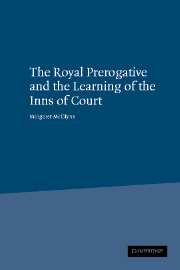Book contents
- Frontmatter
- Contents
- Preface
- List of figures
- List of abbreviations
- Introduction
- 1 The early readings
- 2 Expansion and debate
- 3 Frowyk and Constable on primer seisin
- 4 Spelman, Yorke, and the campaign against uses
- 5 The Edwardian readers and beyond
- Conclusion
- Notes on the appendixes
- Appendix 1 Thomas Frowyk's reading on Prerogativa Regis
- Appendix 2 John Spelman's reading on Prerogativa Regis
- Bibliography
- Index
Conclusion
Published online by Cambridge University Press: 04 July 2009
- Frontmatter
- Contents
- Preface
- List of figures
- List of abbreviations
- Introduction
- 1 The early readings
- 2 Expansion and debate
- 3 Frowyk and Constable on primer seisin
- 4 Spelman, Yorke, and the campaign against uses
- 5 The Edwardian readers and beyond
- Conclusion
- Notes on the appendixes
- Appendix 1 Thomas Frowyk's reading on Prerogativa Regis
- Appendix 2 John Spelman's reading on Prerogativa Regis
- Bibliography
- Index
Summary
The purpose behind the earliest readings on Prerogativa Regis is unclear. Without a definite name and a clear date to attach to them, it is hard to do more than speculate about why a reader in the mid-fifteenth century, or thereabouts, would choose to lecture on the topic. All we can say for certain is that the early readings were shorter and simpler than the later texts, and that they focused primarily on the problems of the delivery of land from ancestor to heir and the issues that this raised for the king's rights. They establish some of the central topics for discussion, but there is no urgency in them. There is little concern with issues of fraud, and not much focus on the niceties of procedure in these early texts.
The readings given by Frowyk and Constable in 1495 raised the stakes. It is striking that the first time we have readings which can be securely named and dated, they are given in the same year by two serjeants-elect. This alone indicates that the text was topical, and it is clear that these readings on Prerogativa Regis were delivered in response to a more intensive application of the prerogative by the servants of the king. The purpose behind that application is not as clear.
- Type
- Chapter
- Information
- The Royal Prerogative and the Learning of the Inns of Court , pp. 246 - 259Publisher: Cambridge University PressPrint publication year: 2003



